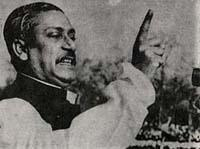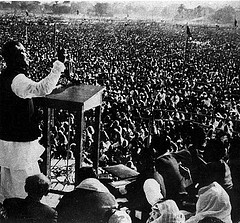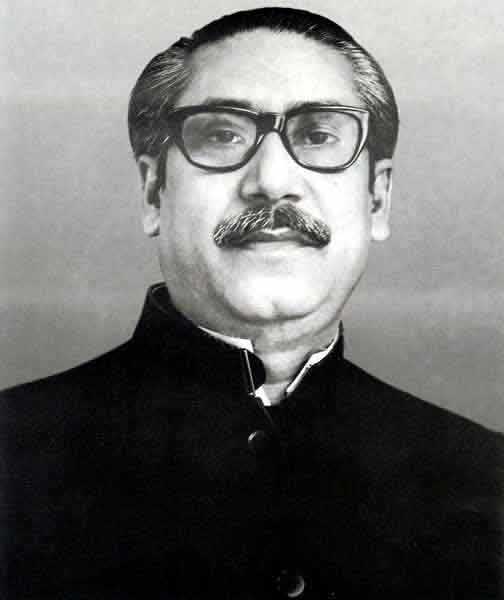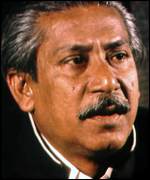 Today is 7th march, 2004. Exactly 33 years ago, on 7th March, 1971, the then President of Awami League, honoured with title of Bangabandhu, named Sheikh Mujibur Rahman, addressed a mammoth rally of the people of Bangladesh at Sahrawardy Uddyan in Dhaka, where he delivered the historic speech, popularly known as `Mujib’s speech of 7th March’.
Today is 7th march, 2004. Exactly 33 years ago, on 7th March, 1971, the then President of Awami League, honoured with title of Bangabandhu, named Sheikh Mujibur Rahman, addressed a mammoth rally of the people of Bangladesh at Sahrawardy Uddyan in Dhaka, where he delivered the historic speech, popularly known as `Mujib’s speech of 7th March’.
I was a physical participant in that rally. Although 33 years of dust has spread on my memories, despite the bitter debate of expectations, frustrations, significance, message or contents of that speech those are being placed to the younger generation of today; for me and many more, the significant value of that speech will indeed remain, as one of the most memorable moments, till death.
To elaborate a little on the perspective and the background of the historic speech of `Bangabandhu’ delivered on 7th March of 1971, which gave the Nation the definite direction to prepare for an armed struggle against the then ruling Pak Military Junta, is undeniable. The words of the greatest orator, whom I heard on my own live being present at Sahrawardy Uddyan, shall stay in my life ringing in my years. “Build fortresses in every of your homesteads”, “Whatever whom possesses take up those to face the enemy”, because, “Henceforth the struggle is our struggle for liberation, and henceforth the struggle is struggle for independence”.
Western journalists present on that day at the historic rally termed the orator as, “The Poet of Politics”. No doubt that was poetry, and the poetry that evolved through long and bitter struggle of the orator and the people of our motherland from 1952 to 1971, long 19 years, in which the orator of that day had always been one of the most remarkable protagonist.
To make that long history of 19 years short. All that started in 1952, the historic Language Movement marking at present the accredited `International Mother Language day’, the 21st February, the pride of our Nation which we presented to the Peoples’ of the World earned by ourselves through the movement and the sacrifice of blood of proud sons of our soil. That movement to establish the right of the Mother Tongue, evolved further-on through the cultural movement of the National self identity, the movement against the autocratic education policy in 1962, the six point demand of Mujibur against economic disparity in 1966 that put him and a host of national leaders to prison; the 11 point movement against the national repression of autocratic rule of Field Marshall Ayub Khan achieving through mass upsurge, release of Sheikh Mujibur Rahman and others from prison, fall of the dictator, the acknowledgment of the demand of adult franchise by the new dictator Yahya Khan, then the victory of Awami League securing majority of the seats in the Parliament of Pakistan in 1970, and then came the historic moment in March 1971 bringing the people of erstwhile East Pakistan face to face with the Military Junta of Pakistan those denied to handover power to the elected representatives of the people.
So, in March 1971, the leader of the nation declared all out non- violent, non –cooperation movement against the Pak Military Junta, and that was the perspective in which the speech of the 7th March was delivered.
Sheikh Mujibur Rahman, was elected leader of the People of the country, emerged through the national election in Pakistan held under adult franchise, the right given through the Legal Frame-work Order promulgated by General Yahya Khan the then Military dictator of Pakistan. Therefore, side by side while giving the clarion call to the people to prepare for armed struggle, in his speech he also pressed the demands in re-enforced language to hand over power to the elected representatives of the people of Pakistan to form a civilian Government with army returned to the barracks.
This very later part of Mujib’s speech of that day became the root of all controversies, raised by the eager aspirators for launching the armed struggle following declaration of independence in advance; similarly, the anti-independence and anti-liberation elements in disguise with the end to undermine the role of Mujibur, even cursed him as traitor, because of the killing and suffering that fell upon the nation when Pak Army cracked down upon the unarmed civilians, Bengali members of Police & Army while they were totally unprepared for waging the fight for resistance and hence the one sided onslaught and genocide continued for few months till the resistance started to take shape.
However, on the same fateful night of 25th March, 1971, Pak Army captured Sheikh Mujibur Rahman from his residence and shifted him to a prison in the then West Pakistan, where he faced the trial against charges of treason brought against him by the then rulers of Pakistan.
Though it was initially delayed but in a month or so, armed resistance got organised and built up with strength of a forceful guerilla warfare by the freedom fighters constituting the members of the Army, Police, Para Military Forces, students, youths, members of intelligentsia, peasants, workers, professionals, from almost all walks of the nation. Nine months guerilla warfare followed by face to face battle waged by the joint liberation forces, as a result of sacrifice of three million martyrs, the Pak army surrendered in the afternoon of 16th December, 1971, giving the first taste of victory to the Bengalee Nation after centuries of foreign dominations.
Shahajahan Siraj M. P.; in 1971 who was leader of Students League the student wing of Awami League, but at present member of BNP and Minister for Environment of the current ruling alliance of Bangladesh, while talking in a discussion telecast of Channel-I titled `Third Dimension’ informed that, the underground movement led by Serajul Alam Khan organized under the name of `Bangladesh Liberation Force’ was already preparing for declaration and subsequent armed struggle for independence much ahead of 1971 or much ahead of Mujib’s, in his word, the `obscure’ call for preparation of armed struggle for independence made on 7th March 1971, which had been then already exposed and demonstrated at Paltan Maidan on 3rd March, 1971 staging militant march past, presentation of the new flag of independent Bangladesh as well as declaration of Manifesto of independent Bangladesh read out by him at the Bot-tala of Dhaka University.
The leadership of BNP goes further in claiming that the declaration of independence was made by Major Ziaur Rahman in Chittagong on 27th March, 1971, at a time when there was no sense of direction available from the National leaders, and when already the Pak Army had cracked down on 25th March, 1971 undertaking the operation of crushing down the movement, which was the definite chromosome of armed resistance against the Pak Army for the liberation and independence of Bangladesh.
Notwithstanding, all those claims and counter claims, the fact remains that, in 1967 the Pak Government of Ayub Khan arrested Sheikh Mujibur Rahman including few of the then officers of civil, army and navy services, framing charges against them for treason and hatching conspiracy to bring about independent Bangladesh alleged to have been masterminded by Sheikh Mujibur Rahman meeting at Agartala, which was widely known later as the alleged, `Agartala Conspiracy Case’. But the case lost its ground with the fall of Ayub Khan in the wake of mass upsurge in 1969, which was led by united front of the students of Dhaka University that claimed sacrifices of many martyrs including that of Sergeant Jahurul Haque, the names of those innumerous martyrs which the nation will always remember, including the unforgettable fiery speeches of Maulana Bhashani, those aroused the nation to challenge the dictatorial regime against the alleged charges of treason brought against Sheikh Mujibur Rahman and others.
Notwithstanding all those claims and counter claims, the fact remains that, Awami League under the leadership of Sheikh Mujibur Rahman earned the confidence of the people expressed through the results of the national election held in Pakistan under the rule of Yahya Khan in 1970, which gave Sheikh Mujibur Rahman the legitimacy to lead the nation to preserve political democracy and to earn economic parity for the people of the then East Pakistan, and which shocked the seat of the power of the military junta of Pakistan, because they knew that, this was the same Sheikh whom they wanted to try for treason in 1969 but failed, so how they could dream to hand over Prime Ministership of Pakistan and handover power to him peacefully.
Notwithstanding all those claims and counter claims, the fact remains that, the pragmatism of the words so chosen and delivered by Sheikh Mujibur Rahman in his speech on 7th March, 1971, and then the crackdown of the Pak army on the civilian population on 25th March, 1971, established beyond any doubt the legitimacy of the people of Bangladesh to declare and wage the war of independence, and hence could earn support and acknowledgment in favour of that from the international community, while the attempt to try the national leaders for treason and to justify the crackdown on the civilians by the Pak Military Junta could get no ground at all.
The pragmatism mixed with uncompromising characteristics of the leadership which brought Sheikh Mujibur Rahman at the centre of the genesis of the independence of Bangladesh, when other national leaders like Maulana Bhashani or Professor Muzaffar Ahmed were also very much present and active in the movement for independent Bangladesh, could not be ignored just because of other centers of efforts not to be undermined even, because those had been the essential features and components which normally constitutes the unity of the people’s war, albeit the centre of political leadership could not be shifted but from him upon whom the ultimate confidence of the people was vested.
The role of Sheikh Mujibur Rahman before 10th January 1972 the date on which he returned to independent Bangladesh from the prisons of Pakistan, and the role of Sheikh Mujibur Rahman that was witnessed after the date of 10th January 1972, should be evaluated separately in the premises of two different perspectives. The attempt of taking over the results of one by the evaluation of the other part is disastrous for our nation, because in the former part lies the perception and spirit of the liberation and independence of Bangladesh, and in the later rests the perception of effort of reconstituting the unity of independent Bangladeshis divided due to their diverse background of socio-cultural-political-economical perceptions and interest from which his own party could not even become an exception.
Hence the effort to put to measure the failure, lapses and successes in the balance of the weighing machine, the legacy of Sheikh Mujibur Rahman of his 23 years of bravery and sacrifices of enduring the repression of the successive Pakistani rulers and the pragmatic but uncompromising leadership which he gave to the nation for the liberation and independence of Bangladesh; with that of three and half years of Prime Ministership of independent Bangladesh, is an attempt so malicious which can be tried only by them who are either confused or motivated in favour of the enemies of independent Bangladesh. The persons who vie for that, undoubtedly their ultimate objective is to malign the true history, perception and spirit of the liberation and independence of Bangladesh.
Author : AFROZA BEGUM
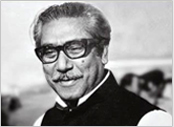 DHAKA, March 7 (BSS) – Mass communication experts and psychologists said a perfect match of people’s desire and incredible manifestation of modern communication concepts made Bangabandhu’s March 7, 1971 speech one of the world’s most notable addresses.
DHAKA, March 7 (BSS) – Mass communication experts and psychologists said a perfect match of people’s desire and incredible manifestation of modern communication concepts made Bangabandhu’s March 7, 1971 speech one of the world’s most notable addresses.
